FOCUS ON WORDS BASIC
Elevpaket – Digitalt + Tryckt
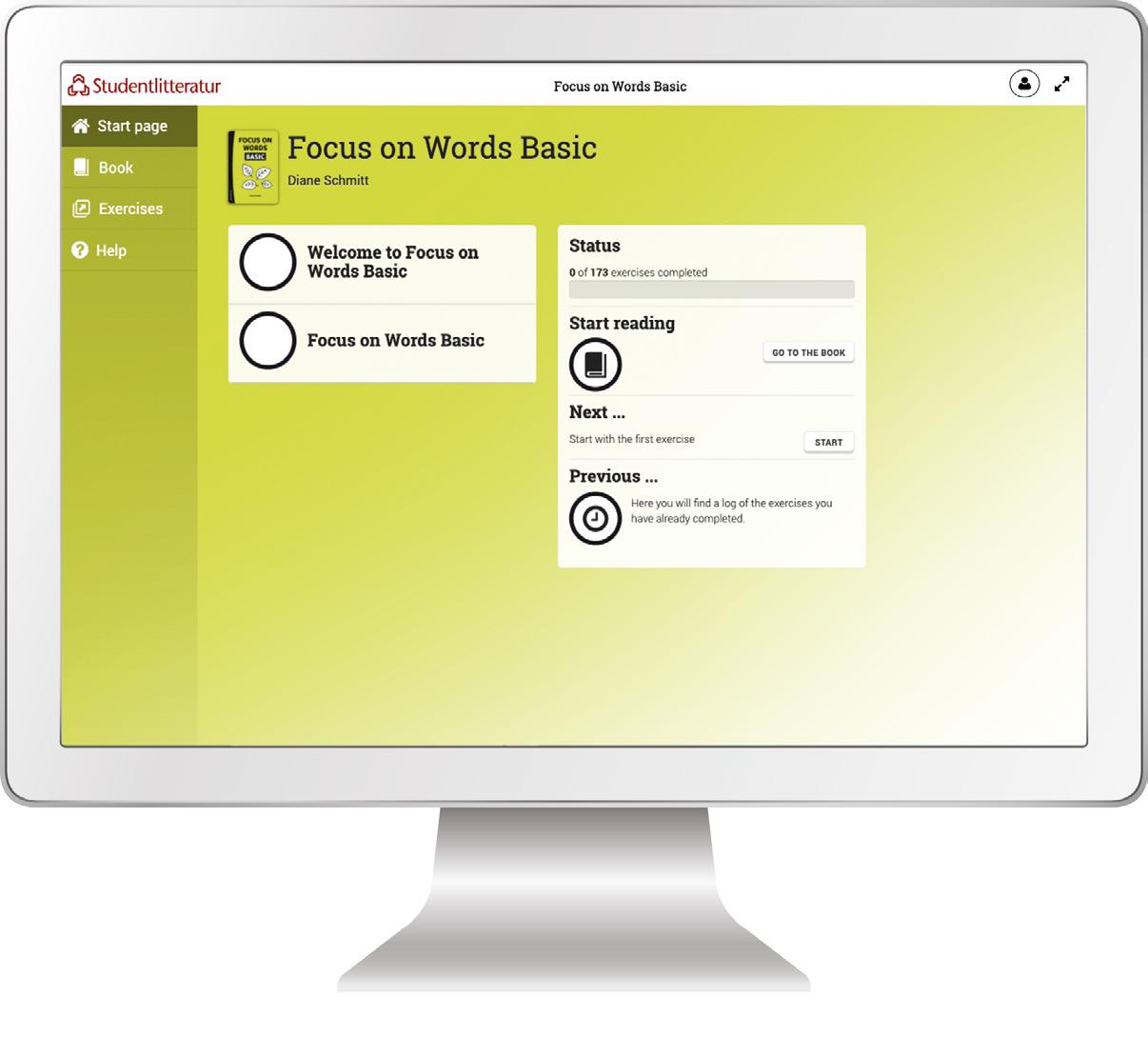




Focus on Words Basic (10-pack) – Tryckt + Digitalt är avsedd för Engelska 5, eller inför Engelska 5. Ordinlärningsstrategier och 300 ord presenteras och övas i tryckt och digitalt material. Orden introduceras i kontext genom lästexter och hörövningar.
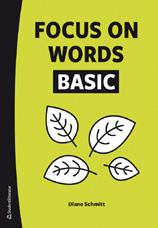
I det 48-sidiga häftet finns praktiska övningar, baserade på teoretisk kunskap, för att utöka ordförråd. Eleverna lär sig både formen – hur ett ord stavas, uttalas och böjas – och vad ordet betyder. Därefter befäster eleverna sina kunskaper genom självrättande övningar.
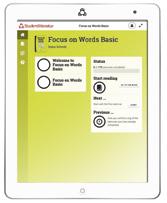
I det digital läromedlet ingår hela tryckta häftet som e-bok, texterna inlästa med textföljning, läromedlets självrättande ordövningar, läromedlets hörövningar, filmade genomgånger där författaren förklarar olika ordinlärningsstrategier
Interaktiv version av boken, inläst med autentiskt tal och textföljning
prova
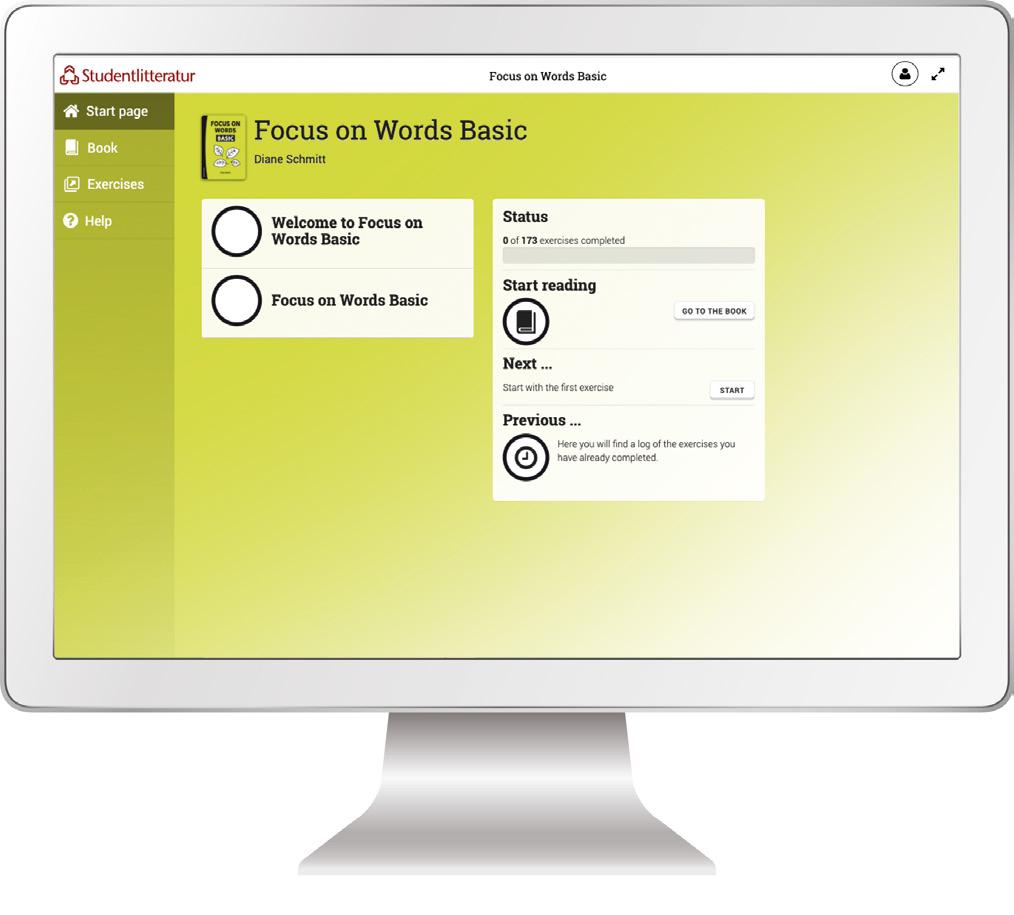
Interaktiva övningar
Fungerar på dator, surfplatta och mobiltelefon
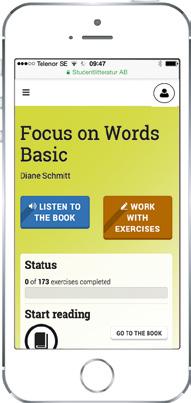
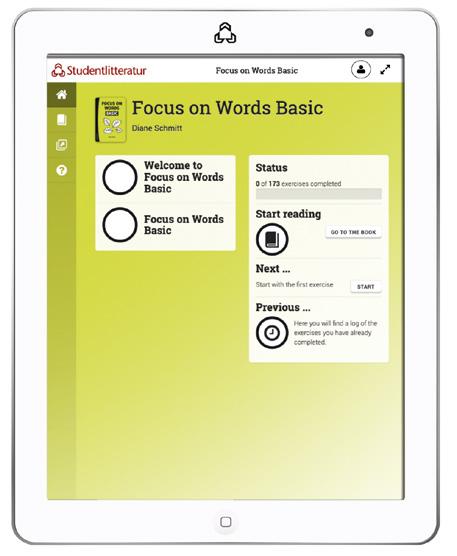
Diane Schmitt
Du hittar det digitala läromedlet i Min bokhylla. Logga in eller skapa konto.
minbokhylla.studentlitteratur.se
Läs mer om hur du får tillgång till ditt digitala läromedel och hur du kommer igång. studentlitteratur.se/licens
Kopieringsförbud
Detta verk är skyddat av upphovsrättslagen. Kopiering, utöver lärares begränsade rätt att kopiera för undervisningsändamål enligt Bonus Copyright Access skolkopieringsavtal, är förbjuden. För information om avtalet hänvisas till utbildningsanordnarens huvudman eller Bonus Copyright Access. Vid utgivning av detta verk som e-bok, är e-boken kopieringsskyddad.
Användning av detta verk för text- och datautvinningsändamål medges ej.
Den som bryter mot lagen om upphovsrätt kan åtalas av allmän åklagare och dömas till böter eller fängelse i upp till två år samt bli skyldig att erlägga ersättning till upphovsman eller rättsinnehavare.
Studentlitteraturs trycksaker är miljöanpassade, både när det gäller papper och tryckprocess.
Art.nr 43805
ISBN 978-91-44-15236-3 Upplaga 1:1
© 2024 Författaren och Studentlitteratur AB
Printed by Dimograf, Poland 2024
Focus on Words aims to help you build your vocabulary by developing the link between a word’s form and its meaning. However, there are many other aspects of knowledge about words that you will need to learn in order to use words well. Click here to watch a video about what you need to learn to really know a word.
One specific type of word knowledge that is important for recognising the meaning of word forms is a word’s family. A word family includes a range of word forms for different parts of speech (nouns, verbs, adjectives and adverbs) that share the same core meaning. Click here to watch a video about word families.
If you want to find out more about what a word means or how you can use it, a dictionary will help. Click here to watch a video about the types of information that you can find in a good learner’s dictionary.
Every unit has 20 target words or phrases to learn. Section 1 introduces the words in a selfassessment quiz. Read and listen to the form of each target word and decide how well you know it. Section 2 presents all of the words in a reading text so you can see how they are used in a context.
Section 3 focuses on building a link between the form of each word and its meaning. The matching exercise introduces each word and its definition. Complete three more meaning exercises to make the link between form and meaning stronger in your memory.
Section 4 presents all of the words in one or two listening texts. Listen to each text to build the link between each word’s spoken form and its meaning.
Sections 5 and 6 focus on developing knowledge of each word’s form. Learning to use the accurate form of new words can be one of the most difficult parts of word learning. The spelling quiz in Section 5 checks whether you have paid attention to the spelling of each word. Section 6 presents the word families that each word belongs to and provides practice working with common patterns of spelling for different parts of speech.
Many words in English have more than one meaning. The most common word forms are used again and again, but with different meanings. So, when you see or hear a word that you know, pay attention to the context. You may need to learn a new meaning.
articulate ethnic influence reflect combat evaluate judge regardless criticise feed legitimate reinforce decline identity mock solely dumbing down inferior prejudice trustworthy
Listen to the pronunciation of the words by clicking on each word in the digital material.
Look at the words in the box. These are the target words for this unit. Use the scale below to score yourself on each word. Write the number in the box in front of each word.
1. I don’t know this word.
2. I have seen or heard this word before, but I am not sure of the meaning.
3. I understand this word when I see it or hear it, but I don’t know how to use it in my own speaking or writing.
4. I know this word.
Read the passage below about accents. As you read, pay special attention to the target vocabulary words in bold
Accents
In Britain, many people still believe that there are only a few ways of speaking English (such as the Queen’s/King’s English or BBC English) that are legitimate and correct, and that other accents reflect a decline in language standards. Although many regional accents are considered pleasing to listen to, some people criticise the education system for not ensuring that everyone learns Standard English. They believe schools should combat the dumbing down of the English language.
Most of the research on prejudice towards accents has focused on those from the north of England. But there is also prejudice towards accents in south-east England. In this region, there are various regional accents which include Estuary English and Multicultural London English (MLE). MLE is spoken mainly by young people in London and is influenced by the city’s many different ethnic communities. There are Estuary English: The regional form of English spoken in London and the counties east of London along the River Thames.
many stereotypes regarding the relationship between south-eastern accents and a person’s social class. These fixed views can reinforce other types of unfairness that we see in the community.
In a recent research project, a group of nearly 200 people aged 18 to 33 from south-east England were played ten-second audio clips of other young people who all read the same sentence. Clips were played of over 100 people from different areas of London and across the south-east.
The participants were not provided with any information about the identities of the people whose voices they heard. They were asked to judge how friendly, intelligent, and trustworthy they thought each person sounded.
The study found that certain groups were evaluated more negatively than others. Based solely on their accents, lower-working-class people were judged to be on average 14% less intelligent, 4% less friendly, and 5% less trustworthy than upper-middle-class people. People from ethnic minority backgrounds were evaluated as 5% less intelligent than white people, regardless of class.
Compared with other areas of the South East, negative judgements were made about people from Essex and certain areas of London. Accents from these places were seen as inferior and regularly mocked. For instance, people from Essex were judged on average to be 11% less intelligent than those from south-west London. Also, women were evaluated as being 2% less intelligent, but 5% more friendly and trustworthy than men.
This study clearly shows that when some people speak, regardless of how articulate they are or important their message is, they are seen as less intelligent, friendly, or trustworthy than other people. Stereotyping someone because of their accent feeds into prejudice related to class, race, gender, and the places people come from.
READ AND LISTEN
Now listen to the text by clicking on it in the digital material. Follow along and pay attention to the stress and intonation.
1. Why do some people think English is being dumbed down?
2. What kind of judgements were people in the survey asked to make?
3. WORD MEANING
A. WORD MATCH
Find the Wordmatch exercise online and match the words with their definitions.
Read the target words and definitions. Then read the sentences. Mark two sentences in which the target word is used correctly.
1. ethnic: relating to a particular race, nation, or tribe and their customs and traditions
a. Many questionnaires ask people about their ethnic background.
b. It is against the law to consider someone’s ethnic background when hiring.
c. The guidebook provided an ethnic description of Machu Picchu.
2. dumbing down: the process of making something less accurate or educational, and of worse quality, by trying to make it easier for people to understand
a. Every year when students' results are announced, there is a debate about the dumbing down of exams.
b. The dumbing down of passengers at airport security slows down the line.
c. The dumbing down of history is likely to increase cultural misunderstanding.
3. regardless: paying no attention, even if the situation is bad or there are difficulties
a. The children love to play outside regardless of the weather.
b. October has been really warm regardless of last year when winter came early.
c. Everyone enjoyed the play regardless of how much they paid for their tickets.
4. to judge: to form an opinion about something or someone, especially after thinking carefully
a. My aunt judges her smartphone every night while she sleeps.
b. Movie goers can judge for themselves how well the film matches the book.
c. I don’t like working with her because she always judges other team members.
5. to influence: to affect or change how someone or something develops, behaves or thinks
a. The Blue Planet documentary influenced many people’s thinking about plastic in the oceans.
b. My older sister’s choice of music influenced which bands I listened to.
c. The referee influenced the penalty given to the other team.
Many words have more than one meaning. Look back at each of these words in the reading. Use the context to choose the best dictionary definition for this text.
6. to reinforce
a. to make a feeling, an idea, etc. stronger
b. to make part of a building, structure, piece of clothing, etc. stronger
7. to reflect
a. to show an image in a mirror, on a shiny surface, on water, etc.
b. to show what something or a situation is like
8. legitimate
a. fair or reasonable
b. acceptable or allowed by law
9. to feed
a. to provide food for a person or group of people
b. to give someone information or ideas over a period of time
10. articulate
a. (of a person) good at expressing ideas or feelings clearly in words
b. (of speech) clearly expressed or pronounced
11. identity
a. the qualities and attitudes that a person or group of people have, that make them different from other people
b. who someone is; someone’s name
criticised decline inferior prejudice trustworthy combat evaluate mock solely
Each sentence contains a paraphrase or synonym for the target word. Read each sentence and then select the matching target word from the box.
12. British people like to Americans for the way they pronounce English place names. (laugh at)
13. The prize was given on the basis of artistic ability. (only)
14. The newspaper moved to a digital platform because of a in sales. (drop)
15. The movie industry is often for producing films that lack creativity and originality. (disapproved of)
16. The new policing strategy aims to gang crime. (stop)
17. We were disappointed to find that our hotel was to the one we stayed in last year. (not as good as)
18. Classmates were asked to each other’s talks so they could make a list of criteria about what makes a good speech. (form an opinion about)
19. The townspeople were looking for a person to become mayor. (honest, reliable)
20. I was shocked by the against women that I found when I joined my new company. (negative attitudes)
4. LISTENING
Go online to listen to more texts using the words.
WORD FORM
E. SPELLING
Find the Spelling exercise online. Listen to each word and spell it in the gap.
Many words belong to a “family” of words that have a shared meaning. In the table below, you can see the word families for some of the target words for this unit. The differences in spelling show parts of speech (noun, verb, adjective, and adverb). Pay attention to word endings. As you meet more words, you will begin to see spelling patterns for each part of speech.
Noun Verb Adjective Adverb evaluation evaluate X X identification identity identify identifiable X influence influencer influence influential X judgement judge X X X legitimise legitimate legitimately reflection reflect X X reinforcement reinforce X X
Listen to the pronunciation of the words. Notice how the stress patterns sometimes change for different parts of speech.
Select a target word from the word families table to complete the sentences below. Write the correct form of the word in the gap. Use each word family once only.
1. The student council played a very role in making decisions at our school.
2. My daughter is easily because she has purple hair.
3. Athletic organisations are arguing over whether to the participation of trans athletes in sport.
4. The employees questioned their boss’s when he suggested holding the Christmas party in the summer.
5. The students’ high scores on the exam were an excellent of how hard they had studied.
6. My dog responded well to positive when I was training her for the dog show.
7. There will be a yearly of employees’ sales numbers.
When we think about the relationship between meaning and word form, we normally think of single words. However, it is also common in English for a single meaning to be represented by a string of words. We can see that in this unit with the phrases for instance and make sense. When you want to express an idea in English, remember that you may need a phrase rather than a single word.
allow complain official shift awkward for instance prefer specify barrier forefront proper upset belief initially reflection view case make sense rude weird
Listen to the pronunciation of the words by clicking on each word in the digital material.
The words in the box are the target words for this unit. Use the scale on the back page to assess your knowledge of each word. Write the number in the box in front of each word.
Read the passage below about gender pronouns. As you read, pay special attention to the target vocabulary words in bold.
Which Pronoun?
Dear Caroline
I identify as non-binary and use “they/them” pronouns. This can sometimes be awkward. For instance, even though my parents think this fine, they wonder if they should say “They are going to the store” or “They is going to the store” when they’re only talking about one person (me!). Another awkward situation is when I tell someone that I prefer the pronouns “they/them” and they complain that using “they/them” in this way makes them feel uncomfortable, so they’ll stick to using “he” and “she”. In the first case, I get that they don’t want to be ungrammatical and in the second, I don’t want to be rude
What’s your view?
Riley
Dear Riley
These are very timely questions because pronouns are at the forefront of language change and official grammar explanations haven’t kept up. So, it makes sense that some reflection on these changes is in order.
1. English has the largest vocabulary of any language. Nobody knows exactly how many words there are in English, but there are at least half a million words. There may even be more than one million words.
2. English has many items made up of multiple words. For example, there are thousands of phrasal verbs (give up, break down) and more than 25,000 idioms (Every cloud has a silver lining).
3. There are only about 150 grammatical words (e.g. a, an, the, on, by, this, they, I we, you). However, because they are used for all topics, they make up about 40% of all written and spoken language. In comparison, the most common 1,000 content (non-grammatical) words also make up about 40% written and spoken language.
4. English content words are about 40% nouns, 32% verbs, 15% adjectives, and 13% adverbs.
5. Some spelling combinations are very common, like str- (strong, strap, strange, string). Other combinations are seldom used like yup- (yuppie). Some letter combinations do not occur at all (stj - no word in English starts with this letter combination).
6. Many English words have silent letters which are not pronounced. For example, you do not say the b in debt or the k or gh in knight. You need to learn to spot these silent letters.
7. English loves to borrow words. The English we use today has borrowed from over 350 languages. Here are just a few examples:
Arabic Hindi/Urdu Japanese Spanish Yiddish algebra cot emoji breeze bagel caravan jungle honcho canyon glitch coffee khaki soy cockroach klutz lemon pyjamas tsunami ranch nosh
zero shampoo tycoon vanilla schlep
Here is the scale to assess how well you know the target words in each unit. Write the number in the box in front of each word.
1. I don’t know this word.
2. I have seen or heard this word before, but I am not sure of the meaning.
3. I understand this word when I see it or hear it, but I don’t know how to use it in my own speaking or writing.
4. I know this word.
Art.nr 43805 10-pack
studentlitteratur.se